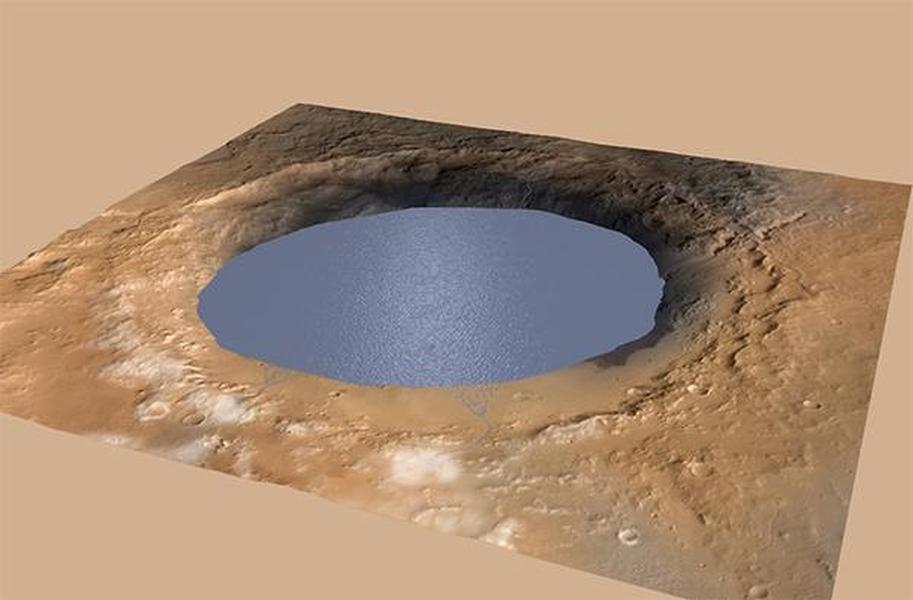Curiosity Rover finds that Mars crater used to be a lake


NASA scientists announced Monday that the mountain explored by the Curiosity Rover may have once been a lake.
The rover landed on Mars in 2012 in the Gale Crater, which is 96 miles in diameter and was formed by an asteroid impact. Scientists have used the rover to investigate Mars and Mount Sharp, a three-mile-high mountain of debris in the middle of the Gale Crater. They believe the layered mountain formed billions of years ago.
Scientists have long wondered about the environment of ancient Mars and why a mountain was in the center of a barren crater. Now, rock images suggest that Mount Sharp formed in a lake bed over millions of years, and the mountain was shaped by sediment deposits. The rover found evidence of lake deposits in the crater, which could mean that Mars' warm, wet period was more recent than scientists previously thought.
The Week
Escape your echo chamber. Get the facts behind the news, plus analysis from multiple perspectives.

Sign up for The Week's Free Newsletters
From our morning news briefing to a weekly Good News Newsletter, get the best of The Week delivered directly to your inbox.
From our morning news briefing to a weekly Good News Newsletter, get the best of The Week delivered directly to your inbox.
"During wet periods, water pooled in lakes where sediments settled out in the center of crater," NASA told Discovery News. "Even during dry periods in the crater center, groundwater would have existed beneath the surface. Then, during the next wet period it would resurface to form the next lake. This alternation of lakes, rivers and deserts could have represented a long-lasting habitable environment."
The scientists are unsure whether microbial life was present in the lake, but Michael Meyer, the lead scientist behind NASA's Mars exploration program, told The Associated Press that the lake had "sufficient time for life to get started and thrive."
A free daily email with the biggest news stories of the day – and the best features from TheWeek.com
Meghan DeMaria is a staff writer at TheWeek.com. She has previously worked for USA Today and Marie Claire.
-
 Did Alex Pretti’s killing open a GOP rift on guns?
Did Alex Pretti’s killing open a GOP rift on guns?Talking Points Second Amendment groups push back on the White House narrative
-
 The 8 best hospital dramas of all time
The 8 best hospital dramas of all timethe week recommends From wartime period pieces to of-the-moment procedurals, audiences never tire of watching doctors and nurses do their lifesaving thing
-
 ‘Implementing strengthened provisions help advance aviation safety’
‘Implementing strengthened provisions help advance aviation safety’Instant Opinion Opinion, comment and editorials of the day
-
 Blue Origin launches Mars probes in NASA debut
Blue Origin launches Mars probes in NASA debutSpeed Read The New Glenn rocket is carrying small twin spacecraft toward Mars as part of NASA’s Escapade mission
-
 Dinosaurs were thriving before asteroid, study finds
Dinosaurs were thriving before asteroid, study findsSpeed Read The dinosaurs would not have gone extinct if not for the asteroid
-
 SpaceX breaks Starship losing streak in 10th test
SpaceX breaks Starship losing streak in 10th testspeed read The Starship rocket's test flight was largely successful, deploying eight dummy satellites during its hour in space
-
 Rabbits with 'horns' sighted across Colorado
Rabbits with 'horns' sighted across Coloradospeed read These creatures are infected with the 'mostly harmless' Shope papilloma virus
-
 Lithium shows promise in Alzheimer's study
Lithium shows promise in Alzheimer's studySpeed Read Potential new treatments could use small amounts of the common metal
-
 Scientists discover cause of massive sea star die-off
Scientists discover cause of massive sea star die-offSpeed Read A bacteria related to cholera has been found responsible for the deaths of more than 5 billion sea stars
-
 'Thriving' ecosystem found 30,000 feet undersea
'Thriving' ecosystem found 30,000 feet underseaSpeed Read Researchers discovered communities of creatures living in frigid, pitch-black waters under high pressure
-
 New York plans first nuclear plant in 36 years
New York plans first nuclear plant in 36 yearsSpeed Read The plant, to be constructed somewhere in upstate New York, will produce enough energy to power a million homes
